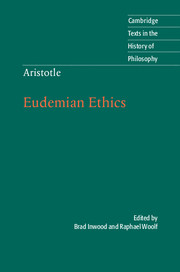Book II
Published online by Cambridge University Press: 05 February 2013
Summary
ii.1.1 Next we must discuss what follows, taking a new starting point. All good things are either within the soul or external to it, and the more choiceworthy of these are those within the soul, a distinction we also make in the exoteric works. For wisdom, virtue and pleasure are in the soul, and some or all of these are considered by everyone to be the goal. Of those in the soul, some are states or capacities, others activities and processes. ii.1.2 Let these distinctions be assumed and let it be assumed further, concerning virtue, that it is the best disposition or state or capacity of each of the things that have some use or function. This is clear from induction, since we consider things to be this way in all cases. For example, a cloak has a virtue, since it has a function and use, and its best state is its virtue. The same applies to a boat and a house, and so on, and hence to the soul, since it has some function.
Let us assume that the better state has a better function. And, ii.1.3 just as states are related to one another, let the functions that arise from them be so related. And let the function of each thing be its end. ii.1.4 So it is evident from this that the function is better than the state. For the end, being the end, is the best thing, since it has been laid down that what is best and ultimate is the end, and all the other things are for its sake. So it is clear that the function is better than the state and the disposition. ii.1.5 But ‘function’ has two senses. Some things have a function that is over and above their use. For example, the function of the builder’s art is not building but a house, and the function of the art of medicine is not healing or treating, but health. With other things, their use is their function. For example, the function of sight is seeing and the function of mathematical knowledge is studying. Hence, where a thing’s use is its function, the use is necessarily better than the state.
- Type
- Chapter
- Information
- Aristotle: Eudemian Ethics , pp. 15 - 40Publisher: Cambridge University PressPrint publication year: 2012

